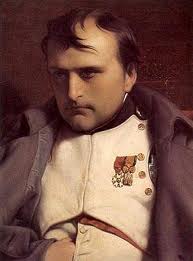Leadership and Motivation
Napoleon once said, “When I realized that men were willing to die for bits of colored ribbon, I knew I could rule the world.” It’s a wholly cynical sentiment but Napoleon was famous for creating and distributing military awards, citations, ribbons, medals, and orders. And for many years, it worked — his troops were highly motivated.
Several hundred years after Napoleon, Tony Blair said something quite similar (though I can’t find the exact quote). A journalist noted

Over to you, Tony.
that Blair was quite the egalitarian and asked if he might not abolish the English system of knighthoods and lordships. Blair responded (more or less), “You must be joking. The system is the most productive, least costly innovation engine in the world. It’s amazing how hard people will work for a tap on the shoulder from the Queen.”
Surprised that the English and the French might agree on something? Perhaps they’re on to something. The moral of the story is that praise and recognition can motivate people even more than money can. I’m surprised that we don’t use it more. I’ve seen far too many managers who are slow to recognize achievements and grudging with their compliments. I’m surprised because, as Tony Blair notes, praise is an inexpensive and productive way to motivate people.
Here’s an experiment. Ask a married couple what percentage of the house work each one does. Ask them separately so one doesn’t hear the other’s answer. Add the two percentages together. Almost certainly, the sum will be greater than 100%. Why? Because each member of the couple has a very good subjective sense of how hard they work. On the other hand, they don’t have that same sense for the other member of the couple. Each one knows how hard they work. It’s quite common that each one feels they deserve more recognition.
Similarly, after a complex project is concluded, ask each member of the team, “What percentage of the value did you personally deliver?” (Again, ask them separately). If the project team has six or more members, when you sum the responses the answer will very likely be greater than 200%. Each person has an inflated sense of how much they contributed.
As a manager, what should you do? The simple answer is to give more praise than you think is absolutely necessary. In fact, give about twice as much as you would normally do. After all, the French and English can’t both be wrong.
The French and English can’t both be wrong? When have they been right? Come on why not throw in the Germans. I could not agree more. In my professional life, I got more out of people by making them Assistant Directors or giving them another title, or public praise and a “ribbon” than any raise. Recognition motivates people far more than money in my experience and titles are cheap, as the kings of Europe knew well.
Bill